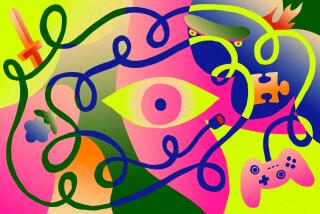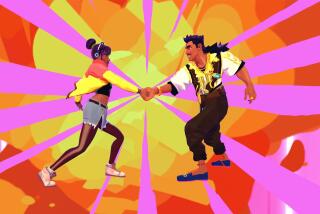TARZANA : Therapy Game Helps Children Discuss Abuse
- Share via
Instead of testing players’ knowledge of North African geography or the evolution of the French farce, this deceptively cheery-looking board game asks more disturbing questions.
* Some grown-ups kick children. Has it ever happened to you?
* Some children pretend they can’t see. What don’t they want to see?
* What did the person say to you while they did the yucky stuff to you?
It’s called Playing It Safe . . . With SASA, and if the questions are disturbing, the answers are often more so. But for an abused 5-year-old, playing a game--even a difficult one--can be less traumatic than sitting on a giant couch and being grilled by a strange therapist.
“SASA is actually a clinical procedure used . . . as a way to stimulate conversation about deep-rooted issues that are otherwise difficult or impossible to elicit during normal counseling,” said co-inventor Susan Brown, director of the Julia Ann Singer Center in West Los Angeles. “It is another way of tapping into the subconscious.”
There is a bright board with spaces marked home, the police station, the worship house, where a player can go after landing on the proper space and discuss what happened there. There are color-coded cards, one set for direct questions about abuse, another for less touchy subjects.
Even the more subtle questions can offer surprising insight. When one young boy drew a card asking, “How would you dress an animal?” he responded, “I would dress it sexy.”
And there is the straw-haired SASA (Speaking About Self-Awareness) puppet. First, the doll is for cuddling, but it also can act as a less threatening counselor. When a question is just too difficult to discuss with the therapist guiding the game, the child can speak to the puppet.
“Children’s medium is game and play,” said clinical psychologist and co-inventor Etti Hadar of Tarzana, also a therapist at the Singer Center. “They don’t always want to talk to you.”
Frustrated with traditional--and often uncomfortable--counseling methods, Hadar and Brown created the game nearly a decade ago. It is now used at therapy centers around the United States and in several other countries.
And though it was created as a tool for counseling children (a therapist must guide the game, which is only available to professional counselors) SASA has proven effective with adults and families as well, the inventors said.
At the Singer Center recently, one mother and her 5-year-old daughter--both having been sexually and physically abused by the girl’s father--played the game as part of their ongoing therapy. It is not always fun, the mother said, but it works.
“I’ve seen a lot of growth for both my daughter and I,” said the 31-year-old mother. “It’s both difficult and rewarding.”
More to Read
The biggest entertainment stories
Get our big stories about Hollywood, film, television, music, arts, culture and more right in your inbox as soon as they publish.
You may occasionally receive promotional content from the Los Angeles Times.










